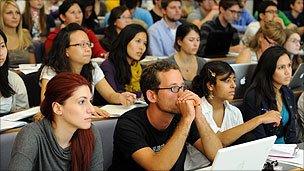Scottish universities 'should sell extra places'
- Published

The report suggests all Scots should pay towards the cost of their degrees after graduation
The next Scottish government should consider letting universities take in extra Scottish students who are willing to pay thousands of pounds in fees, a leading think tank has suggested.
The Fraser of Allander Institute report also suggested all Scots should pay towards degree costs after graduation.
It called for a major inquiry into the future of Scottish higher education.
But university principals said that could delay moves to plug the funding gap between Scotland and England.
Currently, the Scottish government decides how many Scots students can be enrolled in universities and pays for those places.
According to the Strathclyde University-based Fraser of Allander Institute, universities should be allowed to generate extra income by selling additional places.
For example, a law department with enough staff and space in lecture theatres to take 80 students would be able to take in 10 fee-paying students over and above the 70 places paid for by the government.
The report's author, Prof Jim Love, suggested private fees in line with government fees, currently between £4,000 and £16,000 a year.
Maintenance grant
The report argued a likely influx of students from comfortable homes could be countered with a new maintenance grant for living expenses to attract students from less well-off families.
But there are fears that Scottish universities could fall behind when English and Welsh universities begin charging up to £9,000 in annual tuition fees next year.
Prof Love said there was a need for a "more clearly contractual relationship" between government and universities.
The report said: "Governments could restrict themselves to being in a contract with universities to purchase given numbers of student places.
"Equally, of course, universities, as autonomous institutions, should be able to decide whether they wish to take student numbers and fee levels as offered by government.
"Removal of control numbers and the associated clawback arrangements would allow universities to offer places on programmes to home or EU students currently denied access, provided they satisfy entry requirements."
It said this would "start to rebalance the relationship between governments and universities, and opens up the possibility of universities developing another channel for income growth".
The report also looked at the issue of funding universities from a tax-based contribution from graduates, dependent on income from employment.
Prof Love said: "With income thresholds before repayment begins and graduates typically having higher career earnings than others, there is an inherent fairness.
"Crucially, part of this revenue stream could and should be allocated to means-tested maintenance grants for students from disadvantaged groups.
"Contributions being made in post-graduation employment and up-front means-tested maintenance grants will also help encourage participation and access."
'Interesting ideas'
Universities Scotland director Alastair Sim said: "There are some interesting ideas in the Fraser of Allander paper.
"But as four of the five main parties have now ruled out contributions of any kind from students or graduates, the focus now needs to be on Scotland's politicians stepping up to the mark to find the public funding necessary to keep our Scottish universities competitive with those in England."
He added: "Our greatest concern about another review of Scotland's universities is that it cannot be allowed to delay the urgent need to plug the funding gap that will start to emerge between Scotland and England's universities from next year.
"Preventing that from happening will need immediate action after the election."
- Published31 March 2011
- Published14 April 2011
- Published16 March 2011
- Published1 March 2011
- Published21 February 2011
- Published16 December 2010